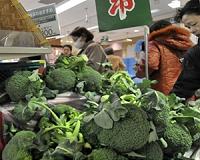| . |  |
. |
Deauville, France (AFP) May 27, 2011 Japan's Prime Minister Naoto Kan used a G8 summit in France to reassure Tokyo's most powerful allies Friday that his country would learn the lessons of its nuclear disaster and recover fully. Kan, making his first foreign visit since his country's March 11 tsunami and nuclear meltdown, received a timely vote of confidence in Japan's recovery on Friday, and an offer of assistance. "We are fully confident in the ability of the Japanese authorities to respond to the challenge and build a speedy and lasting recovery, and we stand ready to assist as needed," the final declaration of the summit said. "Japan will definitely recover, and would like to play a bigger than ever role" in pushing for green energy, Kan said in bilateral talks with German Chancellor Angela Merkel, according to a Japanese official. Kan used the summit to announce plans to host a global meeting on nuclear safety in Japan next year, and pledged to boost Tokyo's share of green energy to 20 percent of total power supply by 2020. "What we've learnt from the earthquake and tsunami is that we should not fear nature, but should live harmoniously with it, harnessing to the maximum what nature has to offer us," Kan told the leaders in France after announcing Tokyo's green energy plans. In addition to nuclear power and fossil fuels, the two pillars of Japan's energy policy, the government needs to develop renewable energy and energy conservation as two additional pillars, he added. "It is our historic responsibility to transmit the lessons to people around the world and to future generations." Tokyo also aims to bring down the cost of solar power generation to a third of its present level by 2020 and to a sixth by 2030, he said, adding that the government aims to install solar panels in 10 million households. But Kan told British Prime Minister David Cameron during a bilateral meeting on Friday that "we want to continue nuclear power while maintaining the utmost security," according to a Japanese official. Merkel, whose government has cooled on nuclear energy, proposed in her bilateral with Kan to "strengthen cooperation between the two countries on renewable energy and green technology," the official said. Nuclear energy currently makes up about a third of Japan's overall energy supply. Tokyo said last year it would boost that to 50 percent by 2030, while renewable energy was to make up just one percent. Japan is struggling to recover from a devastating earthquake and tsunami in March that left 25,000 people dead and an ongoing nuclear crisis that has forced tens of thousands of people to evacuate their homes. The country now faces an energy crunch. Japan has drawn up a timetable in which it aims to stabilise the Fukushima Daiichi nuclear plant by early next year. Currently an international team of IAEA specialists are visiting and inspecting the plant. Describing the nuclear situation as "gradually stabilising," Kan pledged transparency and appealed for support for his country, where the economy slipped into a recession following the twin calamities. "Businesses and tourism are working as usual. Excluding the area surrounding the nuclear plant, radiation levels -- including in Tokyo -- are dropping and they are absolutely unharmful to humans," he added. Kan said the Japanese nuclear safety summit would be held in conjunction with the UN atomic energy watchdog IAEA and would likely take place "late next year". The prime minister said he would make an official visit to the United States in September, following a bilateral meeting with US President Barack Obama. A visit was planned for earlier this year but had to be postponed following the March disaster.
Share This Article With Planet Earth
Related Links The Economy
 Japan consumer prices log first rise in 28 months
Japan consumer prices log first rise in 28 monthsTokyo (AFP) May 27, 2011 Japan's consumer prices rose for the first time in 28 months in April after a huge quake and Arab turmoil raised fuel prices, data showed Friday, but analysts said the deflationary spiral is not over yet. Japan's core consumer price index, which excludes volatile fresh food prices, rose 0.6 percent last month from a year earlier, the first increase since December 2008, according to the inter ... read more |
|
| The content herein, unless otherwise known to be public domain, are Copyright 1995-2010 - SpaceDaily. AFP and UPI Wire Stories are copyright Agence France-Presse and United Press International. ESA Portal Reports are copyright European Space Agency. All NASA sourced material is public domain. Additional copyrights may apply in whole or part to other bona fide parties. Advertising does not imply endorsement,agreement or approval of any opinions, statements or information provided by SpaceDaily on any Web page published or hosted by SpaceDaily. Privacy Statement |